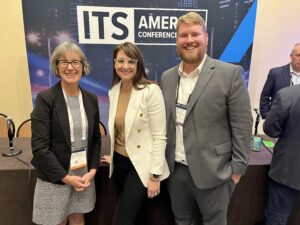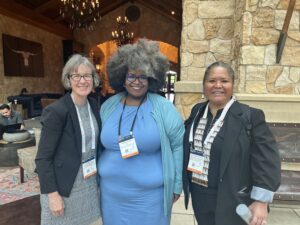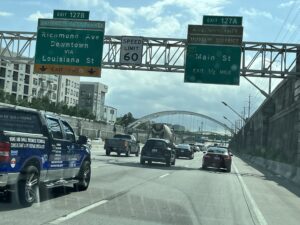
Karen Fehl with Kristen White (COO, ITSAmerica) and Bobby McCurdy (Sen Director, Policy and Advocacy, ITSAmerica)

Karen Fehl with Andrea Thomas (Global Business Director, Internet of Things, Intel Corporation) and HollyAnna DeCoteau LittleBull (Traffic Safety Coordinator at Yakama Nation)

Travelling on the Southwest Freeway in downtown Houston. Five lanes in each direction plus a central HOV express lane, this freeway forms part of the inner high capacity city ring route
Karen Fehl, our Business Operations Manager, and Martin Leak, our Managing Director, recently went to the ITS America 2023 Conference and Expo in Dallas Texas. The 3000+ attendees, mostly from America, came together to share their learnings and recent developments. Martin found the speakers articulate, detailed, engaging and genuine about wanting to share what they had been doing in their own corner of the states.
A key theme of the conference was how technology was being used to address inequity in the transport system, enabling specific groups within the community to be better served. Examples ranged from on-demand transport to connected ITS, autonomous vehicles to toll roads. The Lynden B Johnson Freeway, serving the Dallas Fort Worth area in northern Texas, for instance, incorporates a tolled lane where charges are variable, dependent on a range of factors including not only traffic volumes and congestion but also individual customer profiles, which enables particular sectors of the community to be targeted (teachers during school holidays, for example, and essential health workers during the Covid pandemic).
The question of how transport technology can help lower the U.S. road toll, which hit 43,000 in 2022, 25% at intersections, was raised by Dr Robert C. Hampshire, Principal Deputy Assistant Secretary for Research and Technology, and Chief Science Officer at the U.S. Department of Transportation, who issued an intersection safety challenge as part of a National strategy to get to zero deaths.
Altogether, Karen found it, “an interesting, fun and stimulating week”. She said it was great to hear about (and see) data used for improved identification of safety risk areas and the evaluation of emissions of transport projects; the latest tools for video detection; progress made in CAV (connected and autonomous vehicles) readiness; different approaches to transport operations and corridor management. She heard reports of many, many different approaches to technology use for delivering a more accessible and equitable transport system. She also said Texas was a fascinating place to visit, “it was indeed big, and this extended to warm hosting and grand scale enthusiasm for all things ITS.”
Karen has a deep interest in, and much experience with, intelligent transport systems. She’d be delighted to have a conversation with you about any ideas or issues you may have.




